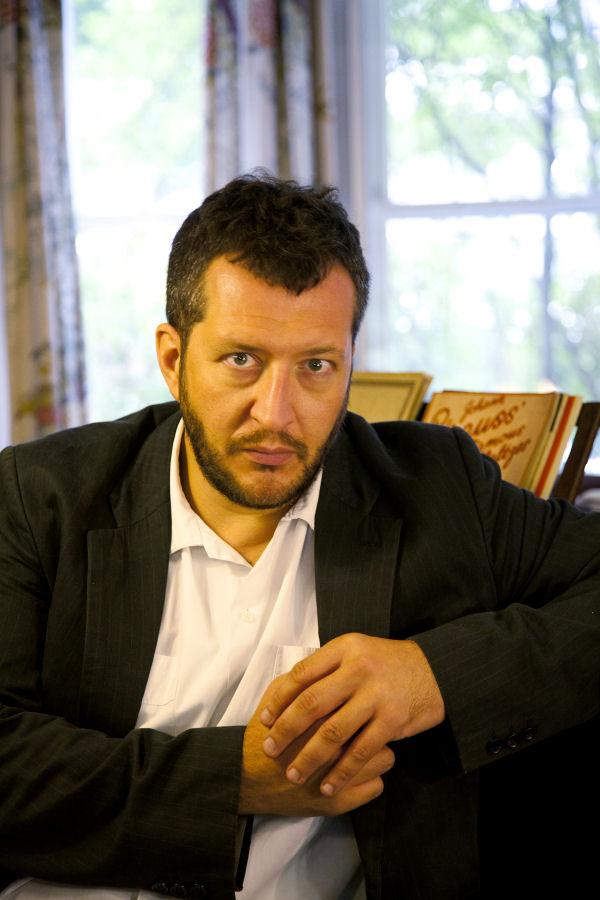Last Tuesday night saw the London Symphony Orchestra celebrating 20th century English music under the baton of Antonio Pappano, launching proceedings with a stylish (and more than a little sexy) rendition of the dance suite from Thomas Adès’ Powder Her Face. Last night the LSO were back with Adès himself for an evening offering a rather more expansive tour through the composer’s work, pairing its dense orchestral textures with a selection of songs from Mahler’s Des Knaben Wunderhorn.
We opened however with music from young Spanish composer Francisco Coll, Adès’s only composition student. Coll’s music is all about textural layering, and his sound-world displays its clear line of descent from the elder composer. Coll also however shares Adès’s skill in orchestration (so amply evident in the miraculous density of Tuesday’s reworked dances – many miles from the ascetic minimalism of the original chamber scoring), and for all its structural slightness Coll’s Hidd’n Blue offered an attractive sampler of his skills, persuasively delivered by the LSO.
The LSO balanced the mechanistic impersonality of the opening with some beautifully characterised solo contributionsAlthough notionally a canon, miniature tone poem Hidd’n Blue certainly doesn’t arrive in the ear as one, with much of the form’s rigidity sublimated and subverted in Coll’s impressionistic treatment. Scored for augmented symphony orchestra, with a generous tuned percussion section, its most distinctive texture is the pairing of glassy bell tones with disembodied rustlings from the strings, against which these brighter, lighter textures are cleanly silhouetted.
Despite its clamorous, multi-layered construction, the beauty of Adès’s In Seven Days is its structural simplicity. Taking the generative, organic act of Creation as the theme of the 7 continuous sections (each representing a day of creation), Adès builds his work out of cell-like musical structures that expand and multiply exponentially, growing into a brassy ensemble climax so typical of his writing. It’s a gesture cleverly tempered by the liquid release of solo piano (played here by Nicolas Hodges, who brought precise attack to Adès’s often percussive treatment of the instrument). The orchestral writing demands much, and the LSO balanced the mechanistic impersonality of the opening with some beautifully characterised solo contributions from flutes and muted brass.
At their best here, despite Adès’s incisive direction the LSO seemed to falter as the evening progressed, with the composer’s glorious Tevot lacking the same ensemble focus and assurance in its colours. Some athletic interludes for tuned percussion aside, the music’s generous cinematic gestures didn’t quite hit home, leaving the audience navigating Adès’s blind harmonic corners with little assistance.
 As exercises in orchestral texture go, it doesn’t get much more vivid than Mahler’s Des Knaben Wunderhorn settings. What should have been the musical core of the evening however proved an oddly strained and disappointed affair, pitting a rather underpowered Toby Spence (pictured right) against the massed might of the LSO.
As exercises in orchestral texture go, it doesn’t get much more vivid than Mahler’s Des Knaben Wunderhorn settings. What should have been the musical core of the evening however proved an oddly strained and disappointed affair, pitting a rather underpowered Toby Spence (pictured right) against the massed might of the LSO.
Even at full strength Spence would have struggled with the over-exuberant weight of the swollen orchestra, and with such disparity ensemble inevitably suffered. Both Revelge and Der Schildwache Nachtlied saw accompanying solo figures part company with the singer, despite Adès’s best attempt both to quieten and control his musicians, and there was more than a touch of the Sunday-night blues about the brass chorale at the start of Urlicht. What can and should be a transcendent moment of musical bliss became a poorly tuned, muted fanfare, certainly not offering much musical encouragement to spur Spence to greater expressive heights.
With such a dense programme to prepare, it’s inevitable that the Mahler may have suffered in favour of the rather less familiar Adès and Coll. The practical reality of orchestral life however is that tickets are no cheaper on a chilly Sunday night than they are during the week, and to hear an ensemble in such generous, heart-swelling form on Tuesday is to be disappointed when that same intensity is absent just a few days later. Adès the composer may have carried the day, but while Adès the conductor laboured no less strenuously, his efforts last night proved rather less striking.















Add comment